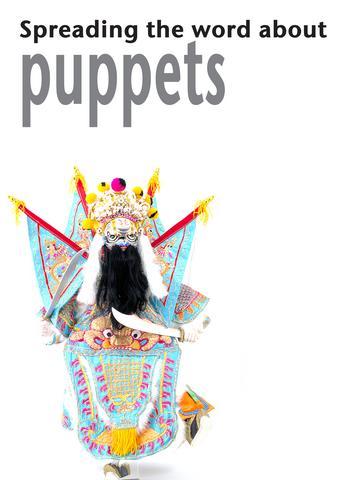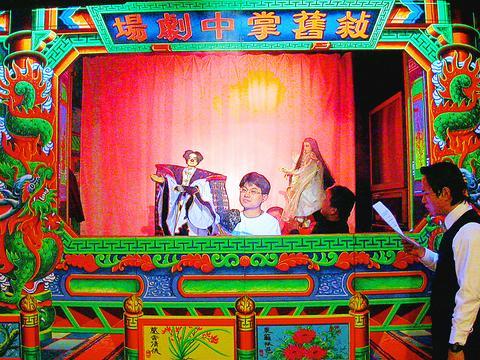We have friends around the world. It is happy fate that our paths cross," were the words written over puppet theater group I Wan Jan Puppet Troupe's (亦宛然) curtains in 1974. At that time, seven foreigners had come from France, Japan, Korea, Australia and the US to study the traditional Taiwanese art form under the legendary puppet master Lee Tian-lu (李天祿).
After they returned to their home countries and set up their respective puppet theaters, many more foreigners got to know puppet theater. As Taiwanese puppet theater gained more international attention, young people here started to see the traditional art form in a new light. "It was like bees pollinated flowers," said Han Chen Chian-hua (陳俊翰), a puppetry instructor at several college puppetry clubs.
To emulate the late puppet master, Chen has volunteered to be an instructor at Hsu Chiou Puppet Theater Restaurant (敘舊布袋戲餐廳 ), a Taiwanese puppet theater-themed restaurant, to teach foreigners the art of puppetry. It will be the first puppet theater course aimed at foreigners. Once five people have enrolled on the free course, Chen said, he can start teaching them right away.

The course, he said, would start with weight-training, which has beginners lift a puppet weighing 2kg, in one hand for five minutes. This is extended to 30 minutes over the six-month course. Even trained puppeteers, Chen said, find it difficult to hold the heavy puppet through a performance, which often lasts for an hour. This is the so-called TV puppet, which stands at 120cm and is larger and flashier than the traditional hand puppet, which is not much longer than a hand.
Today's TV puppets are basically modified Ching-guang puppets (金光布袋戲). They are larger and modernized traditional hand puppets which were created for outdoor performances in the 1970s and then for TV appearances in the 1980s.
From the 1990s, the Pili Channel (霹靂布袋戲) enthralled the country's youth with well-edited special-effects and computer animation-filled TV shows. In what was generally a martial-arts period setting, drama series that featured themes of justice, revenge, conspiracy, mystery and love were played out before its audience of up to 1 million people. Almost every college has its student puppetry club, made up of avid Pili fans. The channel also came up with several computer games and the movie Legend of the Sacred Stone. The puppet series' protagonist, a mysterious demigod Zu Huan Chen, has become a household name.

PHOTO: VICO LEE, TAIPEI TIMES
Chen Chian-hua (陳建華), proprietor of Hsu Chiou, decided to go with the flow and have students learn TV puppetry instead of traditional puppetry.
"It's so popular, everyone knows about these characters from the TV series. They have more appeal for beginners," Chen said. The popularity of puppet show costume plays, in which fans dress up and role-play their favorite puppet characters, is a mark of the popularity of TV puppet shows. Taiwan is the only place in the world, Han Chen said, where "cosplayers" play TV puppet characters, rather than Japanese manga characters.
As TV puppets are all the rage in Taiwan, Chen said he believed that foreigners who want to gain a deeper understanding of Taiwanese culture would find it helpful to learn puppetry.
"Taiwan is the only place where traditional Chinese puppetry has evolved and moved into mainstream media and become something fashionable. There must be people from other countries who want to find out how this traditional art form has not only survived but thrived among young fans," Chen said.
A practical reason for teaching TV puppetry is that it is easier to learn. While hand puppets take four years to learn, TV puppets take only months. On the fifth week of the course, students will practice with Chen Wu Hsuan Long Chi (真武玄龍記) a short play about a young man who gives up his studies to pursue martial arts and then goes on a journey to fight crime and preserve justice. Han Chen wrote the script using characters from TV puppet dramas and included several Taiwanese folk songs.
Although the audience does not have to understand the significance of the masks and other rules to understand the a TV puppet performance, the use of colloquial Taiwanese and references to Taiwanese customs are still a major part of the shows.
The teaching is conducted in Chinese with props such as a transparent puppet to instruct non-Chinese-speakers. Language, Han Chen said, is not a problem in learning and appreciating puppetry. "I have seen Japanese puppet shows and been deeply moved by their solemnity and magnificent beauty. But I don't speak any Japanese at all and understand none of the play's Japanese lines. Puppets can communicate with humans without using language," Chen said.
Chen said he also hoped that the course would lead to Westernized versions of Taiwanese puppet theater. "Since TV puppets are already innovative, anything is possible now. You may speak English lines, even perform English stories," Chen said, adding, however, that some quintessential Taiwanese ideas and traditional verses would be lost.
"Still, two things never change in Taiwanese puppetry, one is that it's performed by puppets only; and the other is that one person does the voice-overs for all the characters, or it's not Taiwanese puppet theater anymore," Chen Chian-hua said.
"As long as you're human, you will be attracted to puppet shows. No matter where you come from, you will enjoy Taiwanese puppet theater," Chen said.

March 31 to April 6 On May 13, 1950, National Taiwan University Hospital otolaryngologist Su You-peng (蘇友鵬) was summoned to the director’s office. He thought someone had complained about him practicing the violin at night, but when he entered the room, he knew something was terribly wrong. He saw several burly men who appeared to be government secret agents, and three other resident doctors: internist Hsu Chiang (許強), dermatologist Hu Pao-chen (胡寶珍) and ophthalmologist Hu Hsin-lin (胡鑫麟). They were handcuffed, herded onto two jeeps and taken to the Secrecy Bureau (保密局) for questioning. Su was still in his doctor’s robes at

A vaccine to fight dementia? It turns out there may already be one — shots that prevent painful shingles also appear to protect aging brains. A new study found shingles vaccination cut older adults’ risk of developing dementia over the next seven years by 20 percent. The research, published Wednesday in the journal Nature, is part of growing understanding about how many factors influence brain health as we age — and what we can do about it. “It’s a very robust finding,” said lead researcher Pascal Geldsetzer of Stanford University. And “women seem to benefit more,” important as they’re at higher risk of

Last week the Democratic Progressive Party (DPP) said that the budget cuts voted for by the China-aligned parties in the legislature, are intended to force the DPP to hike electricity rates. The public would then blame it for the rate hike. It’s fairly clear that the first part of that is correct. Slashing the budget of state-run Taiwan Power Co (Taipower, 台電) is a move intended to cause discontent with the DPP when electricity rates go up. Taipower’s debt, NT$422.9 billion (US$12.78 billion), is one of the numerous permanent crises created by the nation’s construction-industrial state and the developmentalist mentality it

Experts say that the devastating earthquake in Myanmar on Friday was likely the strongest to hit the country in decades, with disaster modeling suggesting thousands could be dead. Automatic assessments from the US Geological Survey (USGS) said the shallow 7.7-magnitude quake northwest of the central Myanmar city of Sagaing triggered a red alert for shaking-related fatalities and economic losses. “High casualties and extensive damage are probable and the disaster is likely widespread,” it said, locating the epicentre near the central Myanmar city of Mandalay, home to more than a million people. Myanmar’s ruling junta said on Saturday morning that the number killed had